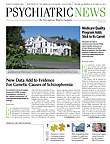As pharmaceutical companies strive to develop new therapies to treat mental illness, some clinician scientists say that the focus should be on tailoring treatment to an individual’s genetic makeup.
Pharmacogenetics is the study—and technology—that analyzes how genetic factors determine an individual’s response to drugs in terms of efficacy and toxicity. It has been applied in different areas of medicine including cancer, cardiovascular disease, HIV illness, and psychiatric research.
Despite what many believe, pharmacogenetics is not a new science, according to David Goldman, M.D., chief of the Laboratory of Neurogenetics at the National Institute on Alcohol Abuse and Alcoholism (NIAAA) and author of Our Genes, Our Choices. “It was first noted during the Korean War when a certain population of soldiers developed hemolytic anemia in response to a specific antimalarial drug,” Goldman explained. He told Psychiatric News that pharmacogenetics did not reach the realms of psychiatry, however, until the 1990s.
Goldman said that some of the initial work in psychiatric pharmacogenetics linked genetic variations to the manner in which certain individuals metabolized alcohol, and “now science allows us to explore the pharmacodynamic differences—differences in the way neurons respond to concentrations of drug therapy.”
Clozapine Study Prompts Research
Determining efficacies for medicines used to remedy mental illnesses—such as depression, attention-deficit/hyperactivity disorder, and eating disorders—has played a major role in the advancement of pharmacogenetics. Anil Malhotra, M.D., director of the Division of Psychiatry Research at the Zucker Hillside Hospital in New York, said that he became interested in pharmacogenetics as a research fellow at the National Institute of Mental Health.
“We were studying the drug clozapine, which showed superior efficacy for treating schizophrenia, but only in certain patients,” Malhotra said. “This prompted us to investigate polymorphisms in particular receptors, such as dopamine receptors, that were suggested at the time to have an association with clozapine response.”
Today, Malhotra focuses on understanding the link between antipsychotics such as risperidone and olanzapine and weight gain in a subpopulation of patients with schizophrenia. “It’s amazing how a person’s genetic makeup can predict a person’s susceptibility to certain side effects,” he said.
Substance Abuse Is Major Target
Currently NIAAA is funding more than 40 studies that are targeted to personalized treatment for substance abuse disorders—treatment for alcoholism being one of the most studied.
Henry Kranzler, M.D., director of the Center for Studies of Addiction at the University of Pennsylvania, received funding for his project exploring the effectiveness of naltrexone—approved by the Food and Drug Administration for treatment of alcoholism—in European Americans with a single nucleotide polymorphism, Asn40Asp, of the mu opioid receptor OPRM1. “If these studies clearly differentiate responders to naltrexone therapy, it could impact the label for naltrexone and yield a robust treatment effect for those with alcohol dependence,” he told Psychiatric News.
Though Kranzler has investigated genetic-based treatment for substance abuse among populations involving multiple ethnicities, he said that findings relevant to populations outside of European Americans are lacking. According to Kranzler, this lack, as well as the limited availability of genetic testing, are limitations that will need to be overcome for personalized medicine to advance therapeutics for psychiatric disorders. “As other medications and their genetic moderators are identified….hopefully, findings will be extended to other population groups.”
As the field evolves, psychiatric researchers are optimistic about the fate of pharmacogenetics in clinical practice.
“The ‘one drug fits all’ concept for very heterogeneous disorders like schizophrenia, depression, and bipolar is not the way of the future,” said Malhotra. “Using genetic tools, such as neuroimaging and other modalities, is very attractive in identifying patients who will benefit more from alternative treatment than from current psychotherapies.” Malhotra believes that some clinicians are apprehensive about the incorporation of genetics into clinical care because of the lack of information on how to master the skills needed in this developing therapeutic realm.
Goldman agreed. “Clinicians have been hearing for a while that genomics will have something to offer them. The incorporation of new knowledge for genetics or neuroscience into psychiatric diagnosis or guidances for clinical care are scarce. I think that we will see in DSM-6 and DSMs beyond that, the incorporation of genetic predictors that will increasingly come into clinical practice and give clinicians new tools for delivering care to patients.” ■

